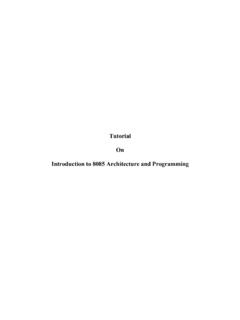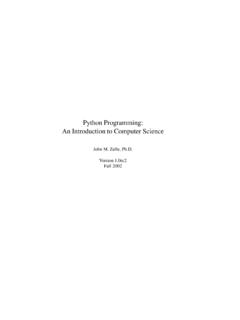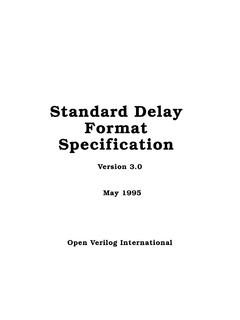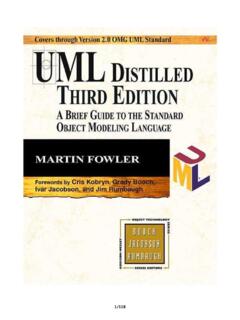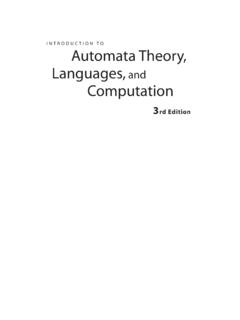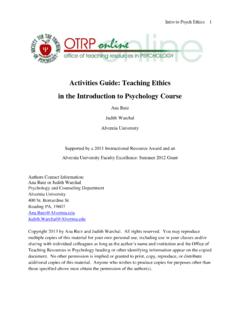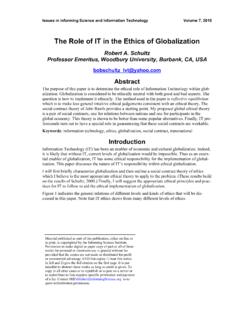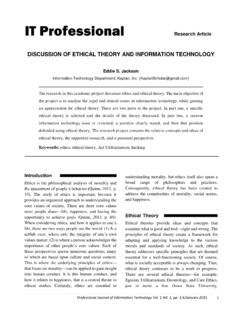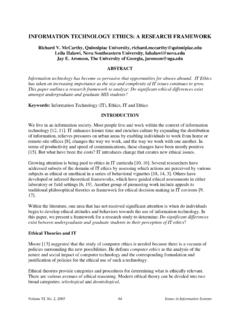Transcription of ce.sharif.edu
1 IContemporary Issuesin ethics andInformation TechnologyRobert A. SchultzWoodbury University, USAIRM PressPublisher of innovative scholarly and professionalinformation technology titles in the cyberageHershey London Melbourne SingaporeiiAcquisitions Editor:Michelle PotterDevelopment Editor:Kristin RothSenior Managing Editor:Amanda AppicelloManaging Editor:Jennifer NeidigCopy Editor:Jane ConleyTypesetter:Diane HuskinsonCover Design:Lisa TosheffPrinted at:Yurchak Printing in the United States of America byIRM Press (an imprint of Idea Group Inc.)701 E. Chocolate Avenue, Suite 200 Hershey PA 17033-1240 Tel: 717-533-8845 Fax: 717-533-8661E-mail: site: in the United Kingdom byIRM Press (an imprint of Idea Group Inc.)3 Henrietta StreetCovent GardenLondon WC2E 8 LUTel: 44 20 7240 0856 Fax: 44 20 7379 0609 Web site: 2006 by Idea Group Inc.
2 All rights reserved. No part of this book may be reproduced,stored or distributed in any form or by any means, electronic or mechanical, including photocopying,without written permission from the or company names used in this book are for identification purposes only. Inclusion of thenames of the products or companies does not indicate a claim of ownership by IGI of the trademarkor registered trademark. Library of Congress Cataloging-in-Publication DataSchultz, Robert A., 1942- Contemporary issues in ethics and information technology / Robert A. Schultz. p. cm. Summary: "This book uses general ethical principles as a basis for solutions to solving ethical problemsin information technology use within organizations"--Provided by publisher. Includes bibliographical references and index. ISBN 1-59140-779-6 (hardcover) -- ISBN 1-59140-780-X (softcover) -- ISBN 1-59140-781-8(ebook) 1.
3 ethics . 2. information technology . 3. technology --Moral and ethical aspects. I. Title. 2006 174'.9004--dc22 2005020635 British Cataloguing in Publication DataA Cataloguing in Publication record for this book is available from the British work contributed to this book is new, previously-unpublished material. Each chapter is assigned to atleast 2-3 expert reviewers and is subject to a blind, peer review by these reviewers. The views expressedin this book are those of the authors, but not necessarily of the publisher. iiiContemporary Issuesin ethics andInformation TechnologyTable of ixSection I: ethics and IT The BackgroundChapter I. Ethical Issues in information technology .. 1 What is ethics ?.. 1 The Value of IT .. 4IT and New Ethical 5 Determining Right and 7 Chapter II.
4 A Background in Ethical Theory .. 12 Right, Good, 13 The Rational Basis of 14 Theories of Right: Intuitionist vs. End-Based vs. 17 Rights, Duties, 20 Theory of 21 Conflicting Principles and 22A Theory of 23 Chapter III. The Context of IT Ethical Issues .. 33 Within an 33 Beyond the 37 Partial 41ivSection II: ethics and IT ProfessionalsChapter IV. Professional Duties .. 44IT Professional 45 Three Codes of 48 Management 57 Chapter V. Justice in a Market Economy .. 60 Market 61A Brief History of My 66 Positive Functions of 67 Ethical Principles Concerning 68 Ethical Consequences for Businesses and 70IT and the Least 71 Chapter VI. Trust Issues in a Market Economy .. 77 Supply Chain Ethical 78 Outsourcing 83 Dealing Ethically with 84 Chapter VII. Offshoring as an Ethical Issue .. 89 Professional Ethical 90 Justice Between 91 The Justice of 95A Global Economy?
5 98 Offshoring as a Competitive 101 Section III: ethics and IT UsersChapter VIII. Privacy and 108 technology and the Right to 111 Current 114 Chapter IX. Copyright and 119 Ownership and 121 Corporations and Basic 125 Ethical Response of the 129 vChapter X. 133 Sales 134 Paperless 137 Fraudulent 139 141 Section IV. Ultimate QuestionsChapter XI. Valuing information 144 The Productivity Paradox, Original 146 Productivity from the Socioeconomic Point of 148 The Value of IT from the User Point of View .. 149 Managerial 151 Conclusions about User 155 Chapter XII. The Ultimate Value of technology .. 158 The Point of View of an Intelligent 159 technology and 160 Three Relevant Ethical 164 The Nature of 166 The Point of View of Modern 168 technology vs. the 169 The Point of View of Being 175 Chapter XIII.
6 The Ultimate Value of information technology .. 180 Modern technology and 181IT, Species Survival, and the 185 information technology and Being 189 Consequences for IT Professional 190 Impacts on Being .. 196 About the 202viBeing trained in history and philosophy and only involved with informationtechnology as a power user, I was feeling both honored and ill-prepared toundertake the task of writing this foreword. I have worked on the edges ofinformation technology as a user of databases and a writer of Web pages forthe courses I teach, but I am by no means an information technology profes-sional. I have a bit more experience with the study of ethics , especially socialethics, but I am not by profession an ethicist. Upon further reflection, how-ever, I believe that my position halfway between the two fields that inform thiswork, as a student of ethical theories and a creator of simple informationtechnology, gives me a unique perspective on Dr.
7 Schultz s work here. I havewritten a bit on the ethical and political impact of information technology as itrelates to distance education and course structure. I have also been a col-league of Dr. Schultz for almost 12 years and have discussed many of theissues here with him before. All of this gives me a good position from which tobegin, for the ethical implications of information technology are issues aboutwhich all of us ought to be , what I have found missing in my experience is a work that guidesusers, writers, managers, and developers through the maze of value questionsthat envelop work with and within information technology . In my own workwriting Web pages for my university courses, I have had to determine theanswer to such questions myself (or turn to Dr. Schultz for advice and de-bate). For example, how do I predetermine access? Should my pages bepassword protected or openly available?
8 Should I learn Flash and Java inorder to expand the possibilities (and bandwidth requirements) of the infor-mation I m displaying, or should I make it as simple and as transparent aspossible so even users of older technology and dial-up can easily access whatI ve created? Mundane questions for some, but they are important in my lineof work for reaching students and a broader international viiOr I have asked myself, how should the information in these Web pages bepresented? Should I use lists, trees, tables, multiple linked pages, and so forth?What are the educational implications of organizing data in certain patterns?Should the presentation be understandable only to initiates or should it beeasily understandable even if you re not enrolled in the course? I have mademy own decisions on these matters (open availability, low-bandwidth require-ments, simplified organization, ease of understandability), but I have madethem after several attempts at other solutions, other combinations, and expe-rience with the end, these are questions about the values of information technology ,about the costs and benefits of the work and the world that information tech-nology creates.
9 These are not technological questions, but ethical questionsabout how human beings treat each other within an environment mediated byinformation technology . To that end, Dr. Schultz has written a marvelous andinformative work that combines reflections on the nature of Informational Tech-nology with its ethical has made two significant contributions to the field herein. The first involvesmoving the problems of ethics and information technology beyond the usualnexus of provider-client relationships, contract obligations, and copyright in-fringement. By looking at the way information is organized, distributed, or-dered, and dispersed, Schultz has raised questions about the ethical effects ofinformation technology on individuals and on society as a whole. By placingsuch questions within the framework of a quest for justice and equity, he holdsup the work of information technology professionals to a higher calling thantechnocratic efficiency.
10 Furthermore, he has placed all these questions in acontext informed by philosophical and ethical reflections on technology itself,as well as information questions have usually been the province of cultural theorists, philoso-phers, or science fiction writers, and have generally been cautionary at bestand dystopian at worst. Dr. Schultz, to the contrary, appreciates the liberatingand developmental possibilities within information technology , while also high-lighting how such technologies can be used in limiting and regressive insights have been developed through the second major contributionthis book Schultz brings together two highly influential theorists of the 20th Century:the American John Rawls (who wrote, among other things, on justice) and theGerman Martin Heidegger (who wrote, among other things, on technology ).In the first place, bridging the worlds of analytic (Anglo-American, logical,scientific) and continental (European, humanistic, phenomenological) philoso-viiiphy is a daunting task only rarely completed successfully.


